Credibility, impartiality, integrity
Text: Vendel Teszler | Photo: Tünde Rácz, JFC Naples, HDF Force Modernization and Transformation Command, Veronika Dévényi | 15:51 November 20, 2023Hungary will safeguard and further strengthen the peace of the Balkans through a two-star general as the incoming commander of the European Union’s mission in Bosnia and Herzegovina
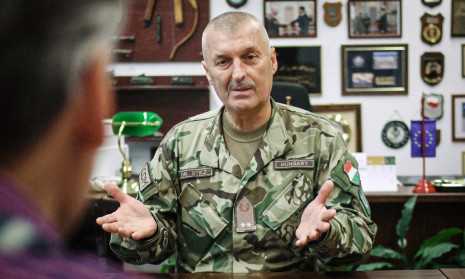
As from January next year, Major General László Sticz PhD will assume command of Operation Althea – EUFOR’s military mission in Bosnia and Herzegovina – for a year. In his person, the EU peacekeeping forces stationing in the Balkans country since December 2004 will be placed under the command of a Hungarian general for the first time.
“Hungary will be the lead nation of the European Union’s largest military operation, which involves a huge responsibility”, says Major General László Sticz PhD about the next chapter of our country’s engagement in the Balkans, and at once about his own mission. After an uninterrupted 15-year period of Austrian command, the commander of the Hungarian Defence Forces (HDF) Force Modernization and Transformation Command is going to take the helm of Operation Althea of the European Union Force in Bosnia and Herzegovina (EUFOR). It is no exaggeration to say that this step has outstanding significance not only in his own career, but also in the history of Hungary’s foreign missions.
Since the end of the Bosnian war that raged between 1992 and 1995, Hungary has been assuming an active role in the settlement of the crisis in the former Yugoslavia. Following the signing of the General Framework Agreement for Peace in Bosnia and Herzegovina (also known as Dayton Peace Agreement) closing the armed conflict, between 1995 and 2004 the Hungarian Defence Forces participated in the activities of two NATO-led multinational peacekeeping missions, first in the Implementation Force (IFOR) and then in the Stabilisation Force (SFOR).
“In that period, the Hungarian troops mostly assumed a role in reconstruction and were professionally performing those tasks that ensured the post-war survival of Bosnia and Herzegovina” – this is how the general recalls those years when the Hungarian Engineer Contingent stationed in Okučani built bridges, and, among others, reconstructed the famous Old Bridge in Mostar.
Following the period of country-building – as Major General Sticz puts it, already under EU supervision – the peacekeepers in Bosnia and Herzegovina, with Hungarian troops in their ranks, became a maneuver force. Several peacekeepers serve in the theatre of operations, while a growing number of them perform their duties as staff officers. For many years, Hungarian soldiers have been filling the camp commander’s position of Camp Butmir in Sarajevo, as well as chief of staff positions at the NATO Headquarters Sarajevo (NHQSa) and the EUFOR Headquarters. In the case of the EUFOR, the chief of staff coordinates the whole spectrum of military activities in support of the commander. As part of this development process – passing on to other nations the opportunity to fill the EUFOR chief of staff’s position – Hungary has applied for the commander’s position of EUFOR Operation Althea and nominated Major General László Sticz PhD for the post. But how did he get here? Among other things, we asked the general this question, nearing the closing phase of his preparation for the command of the mission.
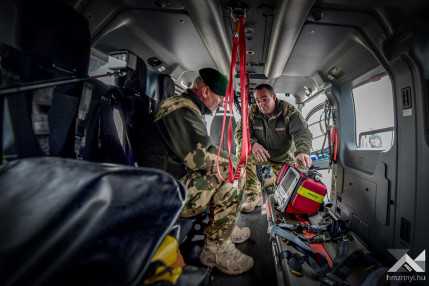
General, why is Hungary’s presence in the Balkans missions important?
When a country is planning to guarantee its own security, it must take into consideration external and internal influencing factors alike. Currently, we are experiencing several tendencies and events around the world that threaten and have a negative impact on the security of all states. Let us just think about the long-running migration issue, with which all countries have been continuously struggling, alongside international terrorism as its concomitant. To cap it all, the recent coronavirus pandemic has been followed by the Russo-Ukrainian War and the Israel–Palestine conflict. These events indicate that all countries must pay special attention to their own security, and must take a complex approach to planning it. The Balkans, and within them, the region of the Western Balkans, have outstanding importance to Hungary in this complex approach. This is not only due to the nearness of the area, but also to the effects that a conflict escalating in the region may bring about on any other country in Europe. The European Union has realized that the only way for it to guarantee the security of its member countries is by taking economic and political – or even military – action in the regions posing security risks. In its 2003 Thessaloniki Declaration, the organization expressed its intention of this three-directional activity, stating that the member states can envision the security of the Balkans, and, with it, that of the EU only if the Western Balkans countries are somehow integrated into the European Union’s sphere of interest. As the military manifestation of these efforts, the European Union took over the operation launched earlier by NATO in Bosnia and Herzegovina. Conducted under a UN mandate, EUFOR Operation Althea is currently the largest military operation of the EU. Hungary’s position remains unchanged: we must lay the foundation for the security of our country in the Balkans, among others in the Western Balkans. The primary dual objective is to safeguard regional stability and through it, the security of our country. After holding the command tenure of NATO’s Kosovo Forces (KFOR) that ended two years ago, we have expressed our intention of attaining this objective again by submitting our application for the command of the EUFOR mission.
How was the application evaluated?
In the first round, the Hungarian application was accepted at the military level of the organization, and then, in September, it was also approved by the EU’s Political and Security Committee. In the first week of November, in the framework of the usual annual procedure, the UN extended the organization’s mandate concerning Bosnia and Herzegovina. With this three-level approval, the international decision-makers have recognized that Hungary is suitable and capable of leading such an outstanding operation of the European Union, rather than merely participating in it.
General, on looking back, which stages of your military career do you see as truly important in the light of your new assignment?
One of the key stages in my career was its beginning, when, having finished primary school, I decided to pursue my secondary school studies in the military boarding school of Eger. From that point on, I practically acquired such skills and knowledge year by year that allowed me to attain such a degree of military socialization in Eger that finishing the military college was plain sailing for me, as I had been preparing systematically for the military career path since the age of fourteen. After the college, I chose a first-echelon unit. In my first posting in Zalaegerszeg, I started my officer’s career at a mechanized infantry brigade at full strength. I really did learn a lot about how mechanized infantry officers should train their subordinates and how they can retain and develop their own skills as well.
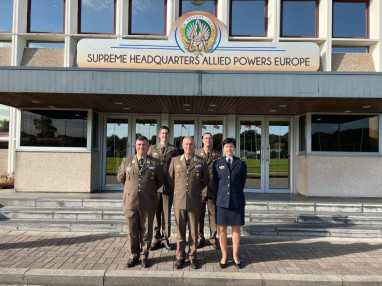
The more I was rising through the ranks, the more the spectrum of responsibility of my activities was widening, and the more my perspective was broadening with regard to the capabilities of the Hungarian Defence Forces. Meanwhile, as battalion commander, I had the opportunity to take an MSc degree from the National Defence University. The next big watershed came after the university, when I had to decide how to continue my career. This was when I joined the HDF General Staff, where I was introduced to the fundamentals of defence planning and force planning. As a staff officer, I started my career at the then defence planning directorate. I was immediately assigned a mission-related task, as I was deployed to Kosovo on a six-month tour of duty, where I performed my tasks in the Operations Centre, in the shadow of the then receding war. It was here in Kosovo that I learned what it is like to work in an international environment, in the mission area; and also, how soldiers working under immense pressure while carrying out a task requiring special training can create together something that is able to ensure the calm of a former battlefield. Based on this knowledge, I did a three-year permanent unarmed service in Belgium as another milestone, during which I had the opportunity to utilize my experience in force planning at NATO’s Supreme Headquarters Allied Powers Europe (SHAPE), so it was here that I practically became a NATO force planner being responsible, as an autonomous Hungarian officer, for the capability development of several nations, and got acquainted with the full spectrum of defence and force planning.
On returning home, I continued my career at the Defence Planning Directorate of the Ministry of Defence. While serving for quite a few years in leadership positions at various levels here in Hungary, I was making use of the experience I had accumulated during the NATO service abroad. First, I was in charge of the coordination of military technology development projects, and then served at the HDF Medical Centre and the Military Hospital in deputy commander and chief of staff positions, until finally returning, in 2016, to force planning as deputy head of the force planning directorate.
Having gone down this road, I immersed myself in the tasks with huge elan, when in 2016 I had the opportunity to participate in the launch of the National Defence and Armed Forces Development Program. As acting head of the force planning directorate, it was me who was really shaping the concept the implementation of which was assigned to the Hungarian Defence Forces by the government and the defence leadership. I was personally responsible for drawing up this ten-year development plan in a written format. Moreover, I was also responsible for the implementation of this plan for quite a few years, since the task system of the Force Planning Directorate was very complex at the time. From specifying capabilities and capability needs to putting them into plans to their implementation, my scope of authority also encompassed the supervision of the then prioritized development and procurement programs. I reached the next milestone of my career in the autumn of 2022, when I was tasked by the Chief of Defence to take over the commander’s position of the Hungarian Defence Forces Force Modernization and Transformation Command and to establish the actual Command, which has been operating under my command to the present day.
Starting from next January, you will be holding for a year the most significant, most responsible command tenure so far in your career. Based on your impressive professional track record, did you anticipate that you would be requested to fill this position?
Several months ago, when it was already discernible that the European Union would be ready to accept the Hungarian EUFOR application, the Chief of Defence told me that he had thought that this task should be assigned to me. He asked me to think about it, and I reported to him that I do not really have to give it much thought, as I am ready to undertake this job. He told me to sleep on it. I replied that even if I were to sleep on it, I would give the same answer. In what followed, I also held a comprehensive discussion with the Minister of Defence, who considered me fit for filling the position. Afterwards, I can confess that as head of the force planning directorate, I had already known several years earlier that Hungary was planning to take over the commander’s position in EUFOR Operation Althea, so upon hearing the news I immediately set myself on this course, because I felt that I was a potential candidate for this post.
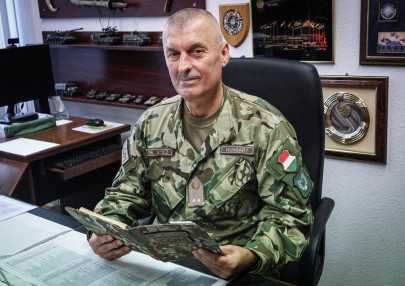
Then, this must help you now with your preparation.
In fact, yes. Having been officially nominated, I had to choose my direct colleagues because this very complex training process is not a one-man procedure: just like on the mission in Bosnia and Herzegovina, the nominated team undergoes the pre-deployment training as a whole. After brushing up on the individual common core skills, the staff was being trained by representatives of different military and civilian subject matter experts, which is a highly time-consuming procedure, but at the same time very useful indeed, because it enables us to know increasingly more and feel being increasingly prepared. All this is complemented with our getting to know the leaders of the EU political-military structure relating to Operation Althea, which involves multiple travels abroad as well. On the occasion of these introductory visits, I receive guidance from our high-ranking hosts about the upcoming one-year command tenure, and of course I, too, inform them about my own goals as a commander. Currently, we are organizing personal meetings with military leaders of the Troop Contributing Nations of EUFOR Operation Althea – focusing on learning about the capabilities provided by the given nations. This kind of interaction forms the basis of our successful future cooperation. The next level of foreign travels is the pre-deployment site survey in the mission area. Here, the most important thing is to gain knowledge, experiences and information on the spot, because by doing so, we can process them ourselves and incorporate them into our own activity already during our pre-deployment training.
Besides Bosnia and Herzegovina, Hungarian troops are also serving in the Balkans in the Kosovo mission. Can you adapt the lessons learned there?
Getting acquainted with the Kosovo mission is another important part of our pre-deployment training, so recently we also visited KFOR. While in Kosovo, we gathered all the information about the types of challenges faced by KFOR, which is conducting an operation that resembles but not identical with the one being conducted in Bosnia and Herzegovina. What it is like when you have to execute your tasks in an environment where nothing is clearly black-and-white, where the complexity of military capabilities and political guidelines determines the way a given mandate is carried out. Besides our travel to Kosovo, our visits to Sarajevo have also proven to be very useful so far. I and my team are doing all we can to make sure that we will have been fully prepared for anything by the time of the commander’s handover-takeover process in January. Following a long and thorough pre-deployment training, we will reach full readiness status by mid-December.
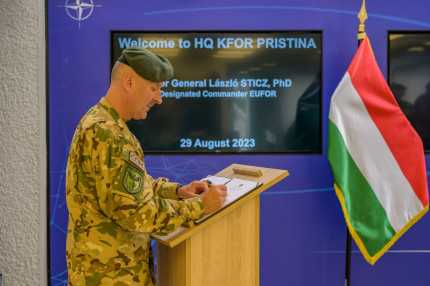
As commander, which option do you consider to take priority in the interest of success: establishing a proper leadership and working style or following the concrete objectives of the mission?
I think that in every case, the key to success is the amalgam of the two, not only in the mission area. Each military leader has their own concept of the effective leadership style, and they feed the knowledge and lessons learned during their socialization process into their system of military leadership. I think it is crucial how military leaders can harmonize, in a complex mission system, this huge amount of knowledge and capabilities – which are represented by soldiers coming from different nations – in an international theatre in the interest of an international task and objective. Insofar as leaders are able to win over their subordinates and coordinate the joint activity, they have succeeded, by all means, in laying the foundation on the leadership’s side for being able to tackle the challenges that always determine the missions’ operation and arise due to the intricate local system of circumstances that further complicate the already not simple basic situation. Besides a proper leadership style, it is necessary to set the basic principles and priorities, which we have already formulated for 2024, the year of the Hungarian command. Based on these – but also in the case of each task to be carried out in international environments – a fundamental requirement is that the military force present in the area be well-trained and therefore can act in a credible way. In Bosnia and Herzegovina, the impartial execution of the tasks is especially important. Another decisive factor will be our ability to integrate the capabilities, circumstances and possibilities, thereby guaranteeing peace and security for the people of Bosnia and Herzegovina. We must become credible in the local people’s eyes, and once we achieve this goal, we will be able to effectively intervene if need arises, acting in compliance with the resolutions concerning our core mandate.
The nation nominating the COMEUFOR also provides the medical evacuation (MEDEVAC) capability of the mission. How are we going to implement it?
MEDEVAC is an air search and rescue (SAR) and aeromedical evacuation (AIREVAC) capability that is to be placed on 24/7 standby day and night, under any circumstances. It primarily serves soldiers in need of help, but also ensures the civilians’ survival if necessary. The joint group of professionals drawn from the HDF Medical Centre and the North-Pest Hospital Centre are preparing for this dynamic, quick evacuation capability with medical purpose together with our helicopter crew, because the commander’s position entails that we, Hungarians are required to provide medium transport helicopter capability and MEDEVAC equipment as well. We provide these items of equipment with the use of Airbus H145M helicopters, the new military assets procured in the framework of the armed forces development program. This summer, we already tested part of our AIREVAC capability during our assistance with the flood relief operations in Slovenia, but the integrated group of military medical professionals and air force crew has never before carried out any live missions like this.
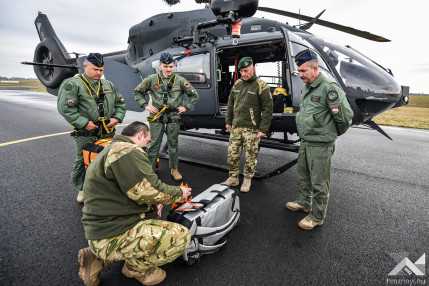
So, does it mean that the new military assets of the Hungarian Defence Forces are going to be tested in Bosnia and Herzegovina?
Yes. When we take new military equipment or capabilities into a mission area, it always means that they undergo there a kind of live test which shows if we are ready to deploy the given equipment or capabilities anytime, anywhere. I’m pleased to say that this is so indeed. In connection with our military equipment being used in Bosnia and Herzegovina, I’d like to mention that our troops serving with our maneuver subunits already have new equipment, namely our new, Hungarian-made small arms. All such items of modernized tactical equipment are available to them that enable them to carry out their tasks anytime, under any circumstances. Obviously, their potential system of tasks may be quite comprehensive in a mission like this. Taking into consideration the lessons learned so far in missions, in relation with the peacekeeping activities in Bosnia and Herzegovina, the possible crowd riot control and civil disturbance operations are high on the agenda of our pre-deployment training and also involve full equipment and new tools. In addition, Hungary also provides explosive ordnance disposal (EOD) capability for Operation Althea, because unfortunately, Bosnia and Herzegovina still ranks among the most mine-infested countries in the world, with a significant part of the area of the country still awaiting humanitarian mine clearance. One of the tasks of EUFOR Operation Althea is to support the continuously ongoing demining operations, in cooperation with local special engineer subunits. Working in a subunit together with specialists from other nations, our EOD technicians – who are constantly deployed for real-world action while working to high standards also here in Hungary – participate in this task with their explosive detection dogs.
In the year of the Hungarian command tenure, what will be the total number of troops to be contributed by Hungary to the activities of EUFOR Operation Althea?
We will be present with around 400 troops, which is almost three times of the current troop level. Of them, some 250 will be present in Bosnia and Herzegovina, and approximately 150 further servicemembers will be supporting the operation from Hungary, so that we can successfully stand our ground in 2024 as well.
General, what are the personal aims that you have formulated concerning your tour of duty abroad?
I will be there as COMEUFOR of Operation Althea to make sure that the leaders of Bosnia and Herzegovina, the different governmental organs and the population of the country can receive from the mission the support of multinational military forces in creating and maintaining a livable and safe and secure environment (SASE), and also in being able to control the EU integration processes in the most effective way possible.
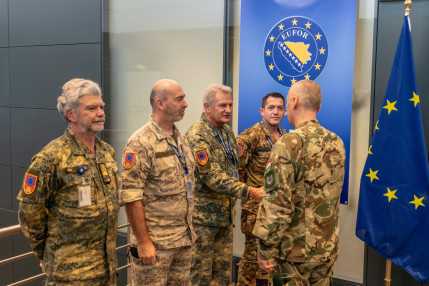
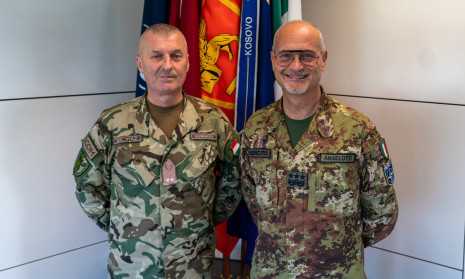
Preparing EUFOR Commander visits NATO Joint Force Command Naples
13:16 November 13, 2023